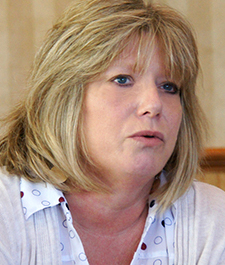State invests in disability services, waiver structure changing, members grow relationships
After a long and at times bumpy legislative session, legislators finally concluded their work setting the state’s upcoming two-year budget late in the day on June 30. Overall, the significant investments in disability services we saw at the close of session were a welcome result instead of the dire predictions at the session’s start for dramatic rate cuts.
For many of these increased investments, it will be critical for MOHR to be at the table for conversations about how to efficiently use these dollars to support people with disabilities to live their best lives. From the current crisis-level workforce shortage to the rapidly growing area of remote services, there is no lack of needs and ideas for how to continue to strengthen our system of supports and services.
I would like to begin with a thank you to all the MOHR members who worked hard this past session to continue to establish and grow your relationships with local legislators. Minnesota legislators are becoming more familiar with services for people with disabilities in their communities. As their knowledge of these services grows, we are able to quickly engage them in discussion about our services and they are more likely to make decisions that support our goals. Thank you for the legislative advocacy you all found time for over the last 18 months. For providers, especially, it was a time of scrambling to adapt your service modes with new remote services, care calls, setting up cohorts and other safety protocols, and much more.
One of the most significant outcomes from this past session was increased investments in the reimbursement rates for services offered through the Disability Waiver Rate System (DWRS). DWRS services will see a nearly $70 million injection of Federal Medical Assistance Percentage (FMAP) funding. The projected increase is anticipated to be 9.7 percent, on average, and begins in January of 2022.
Most of these funds must be used for costs related to employee compensation. While we would have preferred that they be available where most needed by providers, they can’t come too soon to help many providers address the workforce crisis they are experiencing.
In other news, the governor’s proposed reduction in DWRS rates for remote services was not enacted. The Minnesota Department of Human Services (DHS) has asked the federal Centers for Medicare and Medicaid Services to make remote services a permanent option and we hope to hear back on their approval shortly.

Another important issue for MOHR organizations and those we support is Waiver Reimagine Phase II. The legislature authorized DHS to continue to move it forward. This reform initiative will move us toward a two-waiver program structure and individualized budgeting. The legislature passed a requirement for DHS to form an advisory committee with representation across several groups to help inform the process. We will continue to be deeply involved in providing feedback for Phase II.
We were also pleased to see millions in grant dollars for technology to help individuals access services remotely, increased provider capacity in rural or under-served communities, and workforce development. We will meet soon to talk about how we can be sure MOHR members know what is available and how they can access these funds.
For Extended Employment, funds are continuing at current levels which helps support individuals to obtain their employment goals.
There was also action on an issue that has sparked important and robust discussion amongst MOHR members for many years. The Legislature allocated $14.1 million of the federal FMAP funds over three years beginning in 2022 for providers to access “reinvention” grants aimed at moving away from the use of subminimum wage programs. A task force was also established to develop a plan and make recommendations for a phase-out of the subminimum wage option for people with disabilities.
There are many details, yet unknown, and final policies would need to be enacted by lawmakers to achieve this goal. The task force will have its first meeting on February 15, 2022. It is to be made up of government representatives, individuals with disabilities, employers, the Minnesota Disability Law Center, The Arc, an employment/day service provider and a residential provider.
 On a more administrative note, there were changes made to the background study system including a move to a new statewide vendor for processing, an increase in the fee per study and a task force charged with potentially updating the system’s disqualifying factors. There is also an expanded window of 365 days for staff who came in during the exemption from full studies over the COVID-19 period. This is more time for them to complete a fully compliant background study.
On a more administrative note, there were changes made to the background study system including a move to a new statewide vendor for processing, an increase in the fee per study and a task force charged with potentially updating the system’s disqualifying factors. There is also an expanded window of 365 days for staff who came in during the exemption from full studies over the COVID-19 period. This is more time for them to complete a fully compliant background study.
This is not an exhaustive list of provisions of interest to MOHR members and families passed this session but is hopefully a helpful set of highlights.
Thank you for your ongoing support for people with disabilities. We are driven to provide the supports needed to build the best lives we can for the people in our programs.
Julie Johnson
President
MOHR